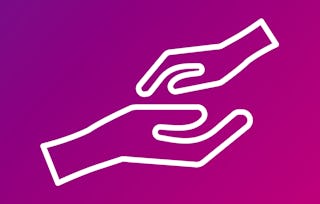In bringing about behavior change in public health, we often focus on the individual mother, student, or farmer. We should not forget the community structure and norms constrain for encouraging individual health behaviors. This course examines the community context of the changes needed to promote the public’s health. We begin by examining the various definitions of ‘community’ and the processes by which we ‘diagnose’ or seek to understand the structure and characteristics of different types of communities.

Community Change in Public Health
Ends soon: Gain next-level skills with Coursera Plus for $199 (regularly $399). Save now.

Community Change in Public Health
This course is part of Foundations of Global Health Specialization

Instructor: William Brieger, DrPH
14,563 already enrolled
Included with
(174 reviews)
Skills you'll gain
Details to know

Add to your LinkedIn profile
See how employees at top companies are mastering in-demand skills

Build your subject-matter expertise
- Learn new concepts from industry experts
- Gain a foundational understanding of a subject or tool
- Develop job-relevant skills with hands-on projects
- Earn a shareable career certificate

There are 5 modules in this course
This week, we'll get oriented to the course, learn about the ecological model, and learn how to classify communities on the basis of identity, linkages, group orientation, and integration.
What's included
3 videos6 readings1 assignment1 discussion prompt
Welcome to Week 2 of Community Change in Public Health. This week's lectures will focus on Community Efficacy and Community Change Models. Learning these concepts will help you gain a deeper understanding of the forces at work within communities and how they can be harnessed to affect positive change.
What's included
4 videos1 assignment1 discussion prompt
Welcome to Module 3. This week, we'll take a look at the political economy framework as well as the concepts of community participation and involvement levels. You'll also complete your first peer review assignment this week by reading a case study and using what you've learned to describe community change.
What's included
3 videos1 assignment1 peer review
This week, we'll look at community coalitions, contrasting community-based and community-directed programs, and the results of enhancing community-directed treatment.
What's included
3 videos1 assignment
In this final week, we'll learn about the Community-Directed Intervention (CDI) process, an expansion beyond the Community-Directed Treatment process used with Ivermectin. Finally, you will complete your second peer-review assignment in which you'll describe a community from a case study and also describe two possible interventions to sustain the change that is already underway.
What's included
1 video1 reading1 peer review
Earn a career certificate
Add this credential to your LinkedIn profile, resume, or CV. Share it on social media and in your performance review.
Instructor

Offered by
Explore more from Public Health
 Status: Preview
Status: PreviewUniversity of Rochester
 Status: Free Trial
Status: Free TrialImperial College London
 Status: Preview
Status: PreviewYale University
 Status: Free Trial
Status: Free TrialImperial College London
Why people choose Coursera for their career




Learner reviews
174 reviews
- 5 stars
75.28%
- 4 stars
19.54%
- 3 stars
2.87%
- 2 stars
1.14%
- 1 star
1.14%
Showing 3 of 174
Reviewed on Feb 11, 2019
Very informative and give me the chance to have a new perspective regarding the essential role of community participation in improving and sustaining the health care system.
Reviewed on Mar 20, 2017
It is a very useful insight into community change in public health and a must for every one who want to ensure sustainability is integrated into his intervention
Reviewed on Jun 29, 2019
Good course, but apparently not enough students to complete the peer review in a timely manner.

Open new doors with Coursera Plus
Unlimited access to 10,000+ world-class courses, hands-on projects, and job-ready certificate programs - all included in your subscription
Advance your career with an online degree
Earn a degree from world-class universities - 100% online
Join over 3,400 global companies that choose Coursera for Business
Upskill your employees to excel in the digital economy
Frequently asked questions
To access the course materials, assignments and to earn a Certificate, you will need to purchase the Certificate experience when you enroll in a course. You can try a Free Trial instead, or apply for Financial Aid. The course may offer 'Full Course, No Certificate' instead. This option lets you see all course materials, submit required assessments, and get a final grade. This also means that you will not be able to purchase a Certificate experience.
When you enroll in the course, you get access to all of the courses in the Specialization, and you earn a certificate when you complete the work. Your electronic Certificate will be added to your Accomplishments page - from there, you can print your Certificate or add it to your LinkedIn profile.
Yes. In select learning programs, you can apply for financial aid or a scholarship if you can’t afford the enrollment fee. If fin aid or scholarship is available for your learning program selection, you’ll find a link to apply on the description page.
More questions
Financial aid available,
¹ Some assignments in this course are AI-graded. For these assignments, your data will be used in accordance with Coursera's Privacy Notice.

